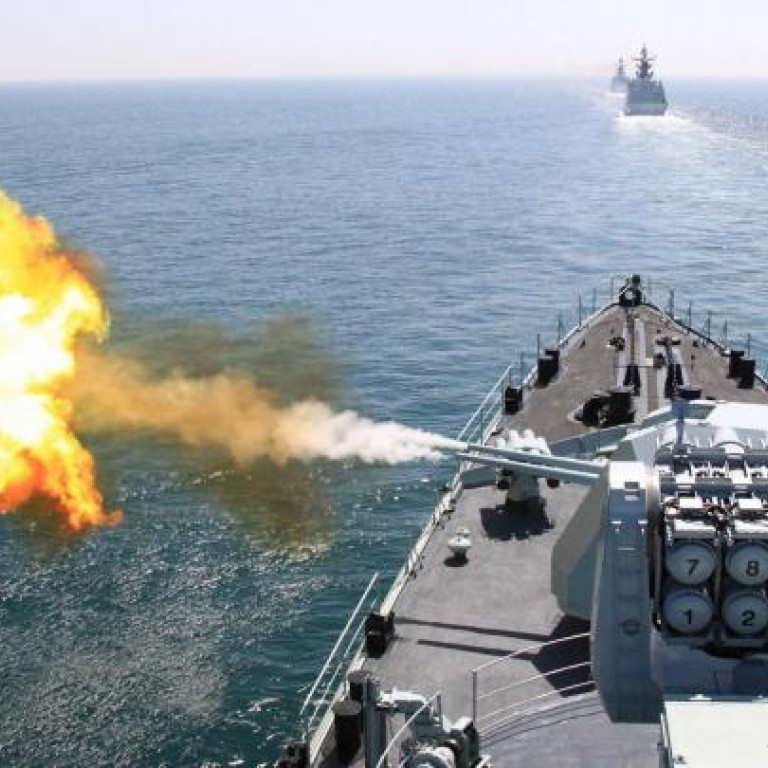
Qing dynasty naval defeat 'a warning' for PLA
Scholars say 1894 naval debacle may be repeated if modernisation comes without political reform
The humiliating defeat of the Qing dynasty's Beiyang Fleet in the mid-1890s is a lesson from history that China must learn as it seeks once again to become a maritime power, naval experts say.
At a sea-power workshop at Shanghai University of Political Science and Law late last year, PLA representatives and naval experts said they were worried that the problems and failures of the Beiyang Fleet would recur in today's naval modernisation, unless China learned from that painful chapter in its history.
The Beiyang (Northern Seas) Fleet was one of four modern naval fleets created by the Qing dynasty (1644-1911) in the late 19th-century's "self-strengthening movement". Responsible for the security of the Yellow Sea, a frequent route of invasion, it became Asia's most powerful fleet after the Qing government ordered 12 warships from Germany and Britain in 1888.
In 1894, on the eve of war with Japan, the Beiyang Fleet matched Japan's entire navy numerically, with the German-built steel-turret battleships Dingyuan and Zhenyuan its most powerful warships. Between 1881 and 1889, the fleet also acquired a squadron of eight armoured cruisers, most of which were built in Britain or Germany. But the whole fleet was sunk or captured by the Japanese during the first Sino-Japanese war, which lasted from August 1894 to April 1895.
At the workshop, naval experts blamed the fleet's defeat on the Qing government's corruption and its reluctance to embrace international maritime law or build a truly modern and transparent naval system.
"Interest groups put their own priorities above the national interest, and they frequently had conflicts with each other," Chen Yue, a specialist in naval history, was quoted as saying by the Shanghai-based . "These are some of the key reasons for the fleet's defeat in the war.
"The Beiyang Fleet was a very pitiful fleet, because its power had been extremely limited. Its commanders had no right to request the weapons it needed, and no right to speak out, and even its combat operations were controlled by different departments," he said.
The Beiyang Fleet was a very pitiful fleet, because its power had been extremely limited
Those at the workshop included naval scholars, retired navy top brass and officers from the PLA navy's three fleets, the reported.
The acquired a copy of Chen's speech, in which he listed the shortcomings of the Beiyang Fleet, including a lack of logistical support, poor-quality munitions, inadequate base security, and an unfair and unsustainable conscription and training system for sailors and officers. He urged the PLA not to repeat its mistakes.
Professor Ni Lexiong , director of the university's sea-power and defence policy research institute and the organiser of the workshop, said China should reform its political system at the same time as it modernised its military, to avoid a repeat of the Beiyang Fleet's failure.
"Political reform will provide a sustainable political foundation to support naval development," he said.
Antony Wong Dong, the president of the International Military Association in Macau, said some of the problems faced by the Beiyang Fleet could be seen in today's PLA Navy.
"Military corruption and dictatorship were the two fatal problems that caused the failure of the Beiyang Fleet. They are also the key obstacles to the PLA navy becoming a real, modern sea power," Wong said, referring to the Communist Party's control of the PLA.
"The PLA, including its navy, is well-known for its poor transparency and its lack of checks and balances. This creates many opportunities for those at its upper levels, especially senior officers in charge of personnel appointments, to benefit privately from their power."
Wong, who did not attend the workshop, said the PLA urgently needed to set up a clear and fair management system to support its modernisation.
"Like the Qing government, the Communist Party is used to taking what it needs - military, industrial and economic elements - and deliberately ignoring democracy, human rights and the rule of law as it goes about its so-called modernisations with Chinese characteristics," he said.
But all those elements were required for effective modernisation, and "not a single one could be omitted", Wong said.
Maritime experts at the workshop said modern weapons were only one of the elements required for a modern navy. They called on Beijing to provide political and legal support for its ambition of becoming a maritime power - a keynote policy that was first declared by President Hu Jintao , and endorsed again by Communist Party chief Xi Jinping in the 18th party congress report in November.
Professor Xu Jilin of East China Normal University said China should make more of an effort to seriously study international maritime law - the rules of the game for global sea power.
"Neighbouring countries will stop seeing China as a threat only when our rise is supported by a strong maritime culture that is in line with modern principles of international justice," Xu said.
Toshi Yoshihara, an associate professor at the US Naval War College who was not invited to attend the workshop, said it was a good sign that Chinese scholars and strategists were willing to learn lessons from the Qing government's naval modernisation.
"The willingness to honestly face the harsh verdict of history is impressive, and it bespeaks China's determination never to repeat its mistakes," he said.
He said the US naval experience had indicated that "it takes a lot of political capital in a democracy to justify investing resources in sea power", but had also showed the world that democracies were inclined to support sea power.

